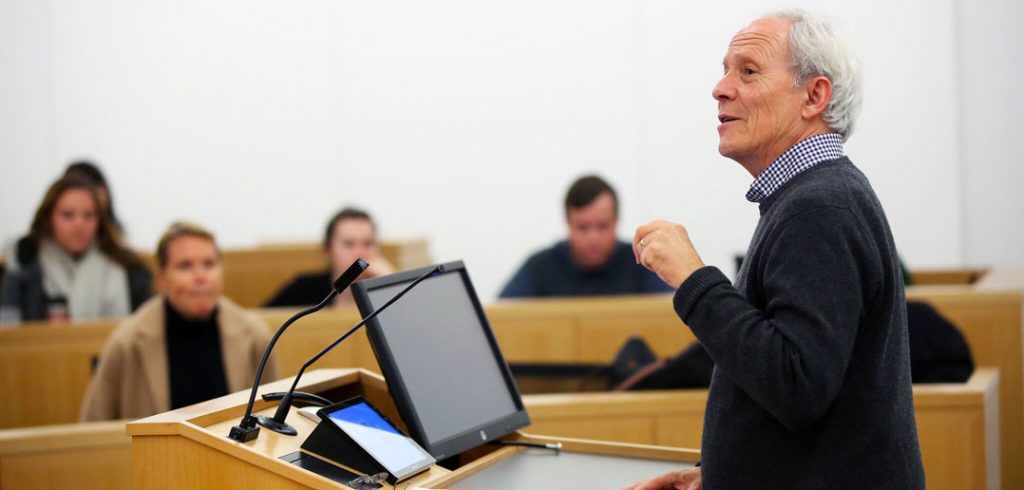In the late 1980s, the outdoor apparel brand Patagonia opened a retail store in Boston. Days later, several employees began to call in sick to work, said Vincent Stanley, the company’s director of philosophy.
With help from an environmental engineer, the company discovered that their ventilation system wasn’t regulating impurities in the air properly. According to Stanley, formaldehyde, a chemical found in cotton sportswear that was stockpiled in the store’s basement, was one of the culprits.
“The more we learned about the way that cotton is conventionally grown, the more concerned we got,” he said at an April 6 talk organized by the Gabelli School’s Center for Humanistic Management.
“One of our big concerns is how we look at the challenges of the planet and ensure that our company is not contributing to those challenges and instead contributing to the solutions.”
After making the decision to convert its entire sports line to organic cotton in 1996, Patagonia took employees on a trip to a conventional cotton field and to an organic field in the U.S. The goal was to show them why Patagonia needed to become a more sustainable business.
“The first thing they noticed when we opened the doors to the bus at a conventional cotton field was the smell of the chemicals,” said Stanley, who has been working with Patagonia, a company founded by his uncle Yvon Chouinard, since 1973. “There were also no birds and if you dug your hands in the soil, there were no worms or vegetation.”
In the late ‘70s, Stanley said Patagonia was growing at the rate of about 30 to 40 percent. Though it took about two years to earn back the level of margin that it had before using organic cotton, the experience shaped the company’s approach to manufacturing clothing for climbers, surfers, skiers, and other outdoor enthusiasts.
“Nobody ever came back from one of these trips saying, “This isn’t worth it,’” said Stanley. “We improved our relationship with our customers because we told the same story we did to our customers to our employees and we gained their trust.”
Becoming a Responsible Company
Since its founding, Stanley said, Patagonia—which started as a supplier of climbing hardware—understood the importance of protecting the environment. But back then, the company viewed nature as the “places where we went to play, climb, surf, or ski,” he said.
“It took a couple of other developments for us to understand that our commitment to nature had to be much deeper than just giving 1 percent of our sales every year to an environmental organization,” said Stanley. “Nature is not just where we go to play. The health of our natural systems underlines all of our social and industrial systems, even in this tiny little town where we were based.”
In addition to the use of organic cotton, Stanley said Patagonia has addressed concerns about wool sourcing, synthetic microfiber pollution, animal welfare, climate change, and fair trade and wages in its global operations. In 2017, the company was recognized at the Annual Meeting of the World Economic Forum for producing quality clothing that doesn’t contribute to waste or the depletion of natural resources. This year, Patagonia was ranked No. 1 in the social good sector of Fast Company’s World’s Most Innovative Companies list.
“There is no shortage of environmental and social problems,” said Stanley. “One of the things that I’m aware of when I’m talking to a group of young people is how much the world has changed since I started working in 1973. It’s a combination of population increase and a very wasteful consumer lifestyle that is putting extraordinary pressures on the environment.”
To discourage overconsumption, Patagonia launched Its Worn Wear program, which allows customers to trade and repair used Patagonia clothing. Stanley argued that buying fewer clothes of high value is a better option for consumers in the long run.
“I think some of the fast fashion companies are experiencing a slow death,” he added. “Fast fashion as a value might still be very good with young people, but [fast fashion companies]are losing millennials when they hit their 20s and 30s.”
Stanley cited Patagonia’s interactive website Footprint Chronicles, which shares information about the company’s supply chain, as an important tool in building transparency.
“Consumers are already very concerned about their food and I think consumers will be willingly concerned about their clothing if they don’t have to fight so hard to get the information,” he said.

